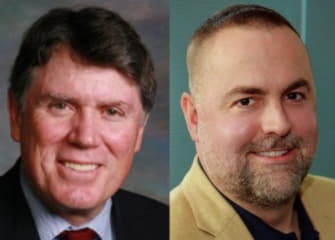
Scott Dorsey and Duane Carey
Click here for Part I, Part II, Part IV, Part V & Part VI
Building connections between Maryland’s businesses and the people who represent them in government
Scott Dorsey is the CEO and chairman of MBRG—Maryland Business for Responsive Government. Duane Carey is the organization’s president. Since 1985, MBRG has educated the members of Maryland’s political and business communities on the questions, challenges, and opportunities facing the state’s private companies, with a focus on holding elected officials accountable to the overall goals of an improved business climate and sustained job growth. A nonpartisan institution, MBRG is supported by corporations, trade associations, chambers of commerce, and individuals.
EDWIN WARFIELD: What should politicians be focusing on right now to grow Maryland’s economy?
SCOTT DORSEY: About a year ago, through the Economic Alliance [of Greater Baltimore], I was asked to participate in a dinner with one of our local political leaders. We talked about the economic climate in Maryland. One of the things that we talked about was “What can we do?” This leader said, “I think Maryland’s pretty good. We have got the mountains, the bay, the beaches. We have biotech. We’ve got NSA. We’ve got great schools, great universities. I think it’s a pretty good place.” I said, “You know, I agree with you completely. We have tremendous assets, but with the benefits we have, we should be a top-10 economy.” His answer to me was “Well, aren’t we?” I was flabbergasted.
DUANE CAREY: This was an elected official.
SCOTT DORSEY: An elected official! A leader who didn’t understand that we were not performing close to our potential. I realized then that I think our elected leaders—in fact, many people that are outside of business—when you see the websites or the articles and magazines about “Best Places to Live,” the metric that they use is often per capita income. Per capita income has very little to do with economic growth. Economic growth is measured by the GDP of a region. I explained that businesses hire people because they need to, not because they can afford to. Economic growth is about demand for goods and services. When we have demand for goods and services, people hire people. Per capita income is about wealth. You don’t hire people because you can afford to you hire people because you need to.
DUANE CAREY: I was going to touch on your metaphor about the nuclear reactor and the dampening rods. I think one of the points that we need to always consider, and it seems to be lost on a lot of legislators is that clearly taxation is a big dampening rod, in your metaphor, but the problem is it’s all very cumulative and multiplicative. So, here’s this one dampening rod of heavier taxation than we have in some of the competing, surrounding states, but then you add to that the estate tax; you add to that that we’re not right work but Virginia is; you add to that that we have very few Fortune 500 companies as opposed to what they have. You add to that a lot of the other cumulative effects of what is happening in the regulatory environment with businesses, where so many businesses feel like they have a target on their back. And “Why are you taxing business?” One of the answers is “Well, because that’s where the money is.” That’s a completely screwed-up concept, but when you put all of those dampening rods together, it’s a multiplicative effect. It’s not just additive.
SCOTT DORSEY: Most of Marylanders are paying close to 9% personal income taxes, when you add the 5.25% that they may be in as high earners, and then you know add another 2.5% or so in most jurisdictions, so you’re getting real close to 9%, and that’s too high. The challenge is how do we fund local government without depending on the piggyback tax? These are hard issues. One of the things that we are seeing is a lot of states are actually reducing tax rates—states with which we’re competing right now. I can give you some examples: Illinois has reduced their personal income tax from 5% to 3.75%. North Carolina has reduced theirs from 7.75% to 5.75%. Remember: this is in the context of Maryland being almost 9%. South Carolina has no personal income tax. Texas doesn’t. Florida doesn’t. So when you throw that piggyback tax in, it’s not a matter of just reducing the tax rates. We have to look at other ways of funding government operations, and we also have to look at efficiency in government as well.
DUANE CAREY: So one of the differences you are pointing out is Colorado for example is more of a consumption tax because it’s a sales tax, as you reason, goods and services. When in this case, it’s taxing income, so it’s an old axiom in economics that what you tax you get less of, but what you subsidize you get more of. As we tax more income, we’re going to get less income. You look at the millionaires’ tax, the business community screamed from the roof tops, “Don’t make that!” Because they’re all going to leave, and then they all left.
SCOTT DORSEY: Look at the so-called “sin taxes.” If they want people to smoke less for health reasons, raise the tax on cigarettes and reduce cigarette consumption. You say that, you know, drinking alcohol is not healthy for people, so we actually raised the sales tax on alcohol—I think it’s actually 9% in Maryland now. The idea of when you want less of something, you tax it more. If we want more income, why are we taxing it more?
DUANE CAREY: The same analogy goes with jobs, too. If you want more jobs, don’t make it more difficult to hire, don’t take away employers ability to look at someone’s criminal record, don’t mandate that they must make a certain high minimum wage that’s not sustainable. If you mandate those things, the jobs go away. It’s not difficult stuff to think about. They’re not difficult concepts. And again, I’ll go back to wealthy states—you can see it empirically in the data. Those states that score well on all of those topics, they grow like crazy. Those states that squelch job growth, they don’t grow.
Connect with Scott and Duane on LinkedIn
Sponsored by:


A full-service commercial real estate firm with nearly 16 million square feet of office in more than 70 locations, Merritt owns and manages more commercial space than any privately held developer in the Baltimore/Washington area and have an unmatched reputation for our commitment to our customers.
Connect with Merritt Properties on LinkedIn, Facebook and Twitter


Edwin Warfield, CEO of citybizlist, conducts the CEO Interviews.
If you're interested in reaching CEOs, please contact edwin.warfield@citybuzz.co
Connect on LinkedIn


































